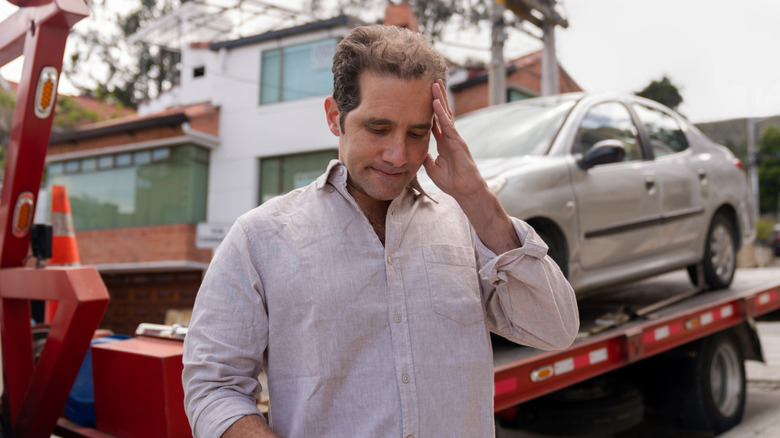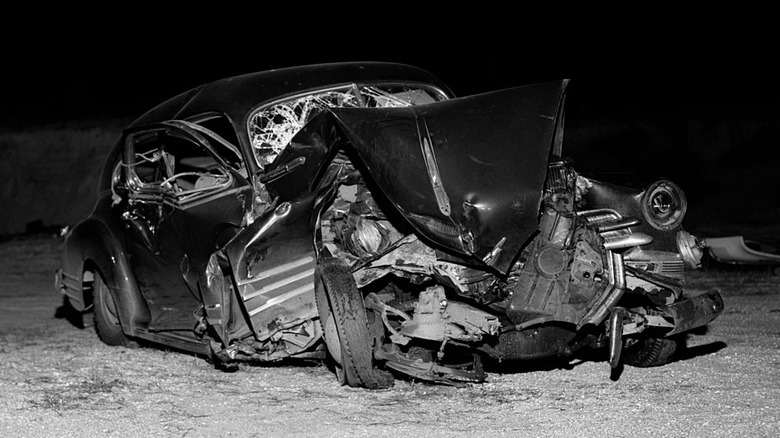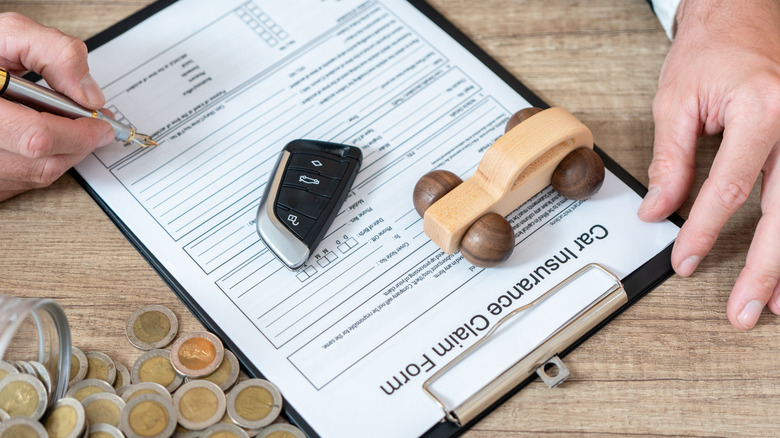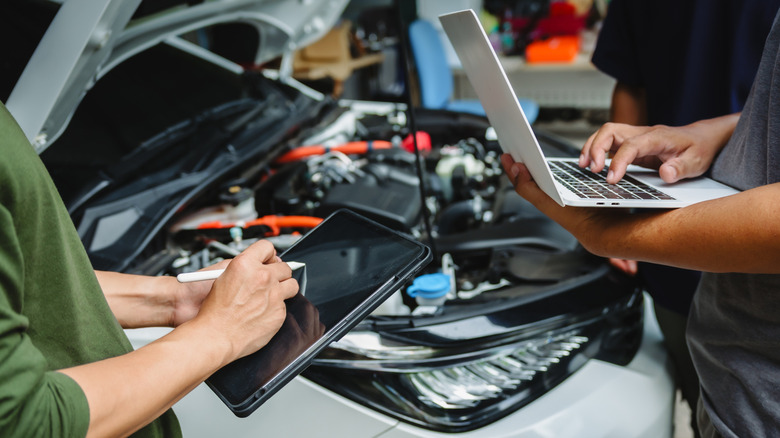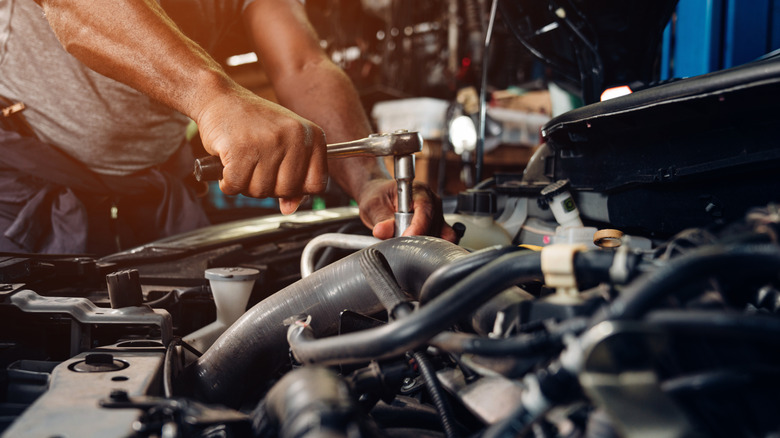What Does It Mean If A Car Is Totaled & What Happens If It's Still Drivable?
So, you've gotten into a terrible accident. Like the responsible person that you are, you filed a claim with your insurance company, and have been patiently waiting for their estimate. How many of you have spent those days or weeks in utter panic, hoping that your insurance company will cover the damages and get you back out onto the road? How many more of you have finally heard back, only to find out that you are now faced with every driver's worst nightmare? Your car is totaled. It is a phrase that strikes as much fear into drivers as it does their insurers. But what does it mean?
The term has become such a mainstay in common parlance that few drivers know what it signifies, let alone what options exist for them after they've received the dreaded news. Instead, their first thought is probably of tabloids showcasing celebrities' crumpled luxury cars. But it is important to know that not all is lost when you find out your car is totaled, and several options exist for those hoping to escape from the harrowing experience.
Totally done for
The term "totaled," broadly speaking, is applied to any car whose repair costs outweigh its actual cash value (ACV). This isn't as straightforward as it seems, however, as individual states require different thresholds for considering a vehicle a "total loss." As it currently stands, just over half of U.S. states define the threshold for a total loss as below the car's ACV, some even setting it as low as 60%. In practice, this means that in states like Louisiana or Michigan, where the threshold is 75%, a car with an ACV of $10,000 only needs to have $7,500 worth of damage to be considered totaled.
Other states, like California, Pennsylvania, and New Jersey, utilize a "Total Loss Formula" (TLF). A TLF essentially compares the cash value of the vehicle to the combined total of its repair costs and salvage value — i.e. your car's current sale value, as is. These calculations can be tricky with newer models, as the price of repairing new cars has disproportionately increased over the years.
On top of these thresholds, some states have additional stipulations for determining if a car is totaled. Georgia, for instance, defines any car in need of two major component replacements as a total loss. Another important factor can be the type of damage inflicted, rather than the costs. For example, many states consider flooded cars to be totaled regardless of the financial costs of repairs. This is especially true for electric vehicles, as their internal systems are particularly susceptible to flood damage.
Your car is totaled, what happens next?
After you've established that your car is totaled, what happens next largely depends on your insurance coverage and the level of damage you've incurred. More than likely, your insurance company will reimburse you for the ACV of the vehicle, minus your deductible. If the damage is determined to be another driver's fault, that process will more than likely go through their property damage liability coverage. This often requires the extra step of proving your lack of fault in the accident, and may delay your ACV payout.
With that being said, you may be lucky enough to have an insurance company that will cover the ACV in the meantime, so always double-check what options are available to you. Be aware, however, that many states employ no-fault auto insurance laws, which will require you to file your claim through your own insurance no matter your level of culpability.
In most cases, your insurer will take possession of the damaged vehicle. For these instances, it is important to note that your insurer's claim of the vehicle does not exempt you from paying off your car loan or lease. For example, if you owe $10,000 and the ACV is determined to be $9,000, you are still liable to pay the $1,000 gap out of pocket. To protect against this, drivers can obtain gap or loan/lease payoff coverage, which will cover the remaining balance.
But what happens if your insurance company does not possess the car after its designation? Is there a way to get your totaled car back on the road?
Salvage titles, and determining if your car is unfixable
Sometimes when an insurance company rules a car is totaled, they will provide the owner with a new title. While there are several types of car titles to be aware of, one of the most common in this instance is a salvage title. A salvage title indicates that the insurer will not possess the damaged car after it pays the claim. Usually, this means the car possesses little financial value, i.e. the insurance company has deemed that it is not worth repairing, reselling, or salvaging for parts. In that case, the owner will receive a salvage title and remain the owner of the damaged vehicle.
A salvage title does not mean that the car is worthless, however. Oftentimes, the owner will receive a title for an array of special circumstances, such as if the car was vandalized, parts were stolen, or if the car previously served as a taxi or a police vehicle. Even if the salvage title is purely damage-related, it doesn't signify that the car cannot be fixed.
So what should you do if you receive a salvage title, especially if your car is still drivable?
Saving the unsalvageable: What happens if my car is still drivable?
Getting a salvage title vehicle back onto the road can be a difficult process. That doesn't mean it's impossible, however, and can be a great option for those who don't mind expending a little elbow grease. As with most projects, information is your best friend. The first step in salvaging your car should always be learning exactly why it received a salvage title — and what it needs to become street-legal. Next, seek out a professional to help you meet your state's safety standards. Whether they fully restore your vehicle, or merely double-check your own repairs, enlisting a professional can ensure critical safety issues don't go unnoticed. It may also save you a major headache down the line.
Once refurbished, you'll need to insure the vehicle. Although more difficult, drivers of salvaged cars can still find an insurance plan that won't break the bank. The first step is to upgrade your salvaged title; a process that usually requires a series of safety inspections. After your car is street-certified, you'll need to shop around for an insurer. While some companies are hesitant to insure salvaged cars, most drivers can expect to be covered for liability insurance, or the damage caused to another vehicle in an accident, personal injury protection, and uninsured motorist protection.
Once your car is repaired, certified, and insured, you are finally ready to hit the road again.
